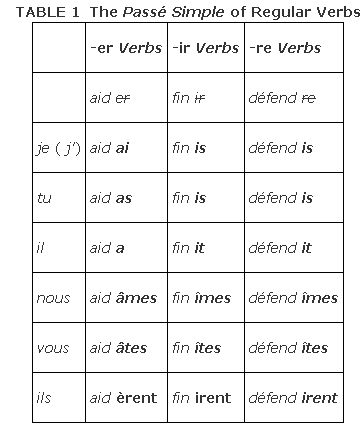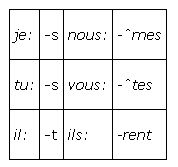The passé simple (past definite) is used primarily in formal, literary, and historical writings to express a completed past action, event, or situation. In conversation and informal writing, the passé composé is used instead of the passé simple to express the past.
Here are two examples of the passé simple.
- Il aida les pauvres. (He helped the poor.)
- Les soldats perdirent la bataille. (The soldiers lost the battle.)
The passé simple of regular verbs
The passé simple of regular verbs is formed by dropping the infinitive endings (‐er, ‐ir, ‐re) and adding the endings illustrated in Table 1.

The following spelling changes occur in the passé simple:
Verbs ending in ‐cer change c to ç before a to maintain the sound of soft c:
- avancer: j'avançai, tu avanças, il avança, nous avançâmes, vous avançâtes, ils avancèrent
Verbs ending in ‐ger change ‐g to ‐ge before ‐a to maintain the sound of soft g:
- voyager: je voyageai, tu voyageas, il voyagea, nous voyageâmes, vous voyageâtes, ils voyagèrent
The passé simple of irregular verbs
Verbs with irregular stems in the passé simple generally end in ‐i or ‐u and have the following endings:

For example:
- Jeanne d'Arc naquit en 1412 à Domrémy. (Joan of Arc was born in 1412 in Domrémy.)
- En 1066 Guillaume le Conquérant devint roi de l'Angleterre. (In 1066, William the Conqueror became the king of England.)
Table 2 lists the most common irregular verbs in the passé simple and their stems. Note that many of these stems are the same as, or closely resemble, the past participle of the verb.
|
